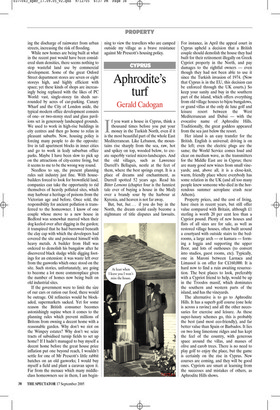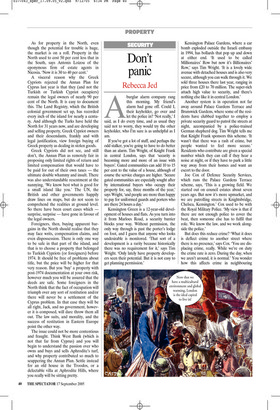Aphrodite’s turf
Gerald Cadogan
If you want a house in Cyprus, think a thousand times before you put your money in the Turkish North, even if it is the most beautiful part of the whole East Mediterranean. Like Lebanon, the mountains rise sharply from the sea, raw, hot and spikey on top, wooded below, to create superbly varied micro-landscapes. And the old villages, such as Lawrence Durrell’s Bellapais, nestle at the feet of them, where the best springs erupt. It is a place of dreams and enchantment, as Durrell spotted 52 years ago. Read his Bitter Lemons (chapter four is the funniest tale ever of buying a house in the Med) over a brandy sour by the harbour at Kyrenia, and heaven is not far away.
But, but, but... if you do buy in the North, the dream could easily become a nightmare of title disputes and lawsuits. For instance, in April the appeal court in Cyprus upheld a decision that a British couple should demolish the house they had built for their retirement illegally on Greek Cypriot property in the North, and pay damages to the rightful owners — even though they had not been able to use it since the Turkish invasion of 1974. (Now that Cyprus is in the EU, this decision can be enforced through the UK courts.) So keep your sanity and buy in the southern part of the island, which offers everything from old village houses to bijou bungalows, or grand villas at the only de luxe golf and leisure resort between the West Mediterranean and Dubai — with the evocative name of Aphrodite Hills. Traditionally, the great goddess appeared from the sea just below the resort.
Her island is an easy transfer for the British. English is universal; driving is on the left; even the electric plugs are the same; the World Service comes loud and clear on medium wave, as the transmitters for the Middle East are in Cyprus; there are many good new wines from small vineyards; and, above all, it is a close-knit, warm, friendly place where everybody has some relation in the UK (and all too many people knew someone who died in the horrendous summer aeroplane crash near Athens).
Property prices, and the cost of living, have risen in recent years, but still offer value compared with Britain, although £1 sterling is worth 20 per cent less than a Cypriot pound. Plenty of new houses and flats of all sizes are for sale, as well as restored village houses, often built around a courtyard with outside stairs to the bedrooms, a large arch — or kamara — forming a loggia and supporting the upper floor, and lots of outhouses (to convert into studios, guest rooms, etc). Typically, one in Maroni between Larnaca and Limassol is on offer for C£160,000. It is hard now to find a ruin awaiting resurrection. The best places to look, preferably with a Cypriot friend to help, would be up in the Troodos massif, which dominates the southern and western parts of the island, and has the vineyards.
The alternative is to go to Aphrodite Hills. It has a superb golf course (one hole is across a ravine) and all the other necessaries for exercise and leisure. As these super-luxury schemes go, this is probably the best (and most eco-friendly), and far better value than Spain or Barbados. It lies on two long limestone ridges and has kept the feel of the country, with generous space around the villas, and masses of olive and carob trees. There is no need to play golf to enjoy the place, but the game is certainly on the rise in Cyprus. New courses are coming, and they will be good ones. Cypriots are smart at learning from the successes and mistakes of others, as Aphrodite Hills shows. As for property in the North, even though the potential for trouble is huge, the market is on a roll. Property in the North used to cost 50 per cent less that in the South, says Antonis Loizou of the eponymous firm of estate agents in Nicosia. ‘Now it is 30 to 40 per cent.’ A visceral reason why the Greek Cypriots rejected the Annan Plan for Cyprus last year is that they (and not the Turkish or Turkish Cypriot occupiers) remain the legal owners of nearly 90 per cent of the North. It is easy to document this. The Land Registry, which the British colonial government set up, has recorded every inch of the island for nearly a century. And although the Turks have held the North for 31 years now, and are developing and selling property, Greek Cypriot owners and their descendants, frankly and with legal justification, view foreign buying of Greek property as dealing in stolen goods.
Greek Cypriots did not see, and still don’t, the Annan Plan as remotely fair in proposing only limited rights of return and limited compensation that would have to be paid for out of their own taxes — the ultimate double whammy and insult. There was also understandable resentment at the nannying, ‘We know best what is good for a small island like you.’ The UN, the British and other governments happily draw lines on maps, but do not seem to comprehend the realities at ground level. So there have been court cases which surprise, surprise — have gone in favour of the legal owners.
Foreigners, then, buying apparent bargains in the North should realise that they may face writs, compensation claims, and even dispossession. There is only one way to be safe in that part of the island, and that is to choose a property that belonged to Turkish Cypriots (or foreigners) before 1974. It should be free of problems about title, but the price will be higher for that very reason. But you ‘buy’ a property with post-1974 documentation at your own risk, however much you will be assured that the deeds are safe. Some foreigners in the North think that the fact of occupation will triumph over any sort of restitution and/or there will never be a settlement of the Cyprus problem. In that case they will be all right, Jack, and no government, however it is composed, will dare throw them all out. The law suits, and morality, and the success of restitution in Eastern Europe point the other way.
The issue could not be more contentious and fraught. Think West Bank (which is not that far from Cyprus) and you will begin to understand the passion over who owns and buys and sells Aphrodite’s turf, and why property contributed so much to scuppering the Annan Plan. Settle instead for an old house in the Troodos, or a delectable villa at Aphrodite Hills, where you really will be sitting pretty.




















































 Previous page
Previous page